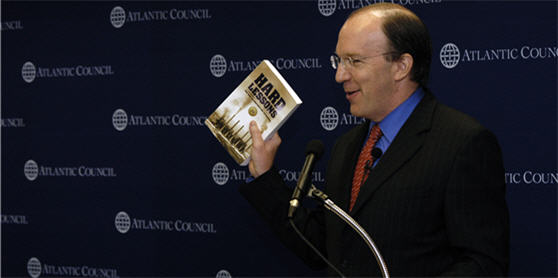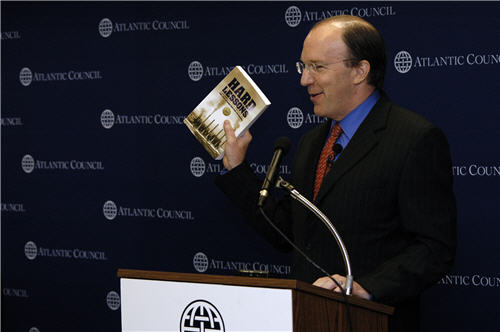
Stuart Bowen, the Special Inspector General for Iraq Reconstruction, argues that we need an “international FEMA” to coordinate complex contingency operations across the various agencies of the American government and institutionalize lessons learned.
Doing Contingency Operations Better
Atlantic Council president and CEO Fred Kempe kicked off the discussion by noting George Santyana’s dictum that “Those who cannot remember the past are condemned to repeat it.” Two-time former National Security Advisor Brent Scowcroft observed that we have a bad habit of “failing to learn from experience, especially if it’s an unpleasant experience.”
Bowen agreed, noting that the Clinton administration issued a series of Presidential Decision Directives in the 1990s only to have them rescinded by National Security Presidential Directive 1 a few days into the Bush administration. This was followed by another series of directives and reorganizations in the first years of the Iraq War.
Despite all that, Bowen contends, there is still “no real integration” at the interagency level for complex contingency operations. Even though the United States has been involved in fifteen of them since World War II (almost all of them since the Cold War) we still have very little institutionalization. To solve this, he recommends a full time agency along the lines of FEMA that draws resources from Defense, State, and other agencies as needed for a particular operation.
Atlantic Council vice chairman Frank Kramer agreed with Bowen’s analysis, adding that, in addition to fixing the interagency, we have huge deficits in both assessment and partnership that must be addressed. That is, we enter these operations with very little understanding of the situation on the ground, including the local culture and players, and have no formalized doctrine for working with host nation leaders, including such critical issues as working to minimize official corruption.
Asked by Kempe what role NATO and the EU could play, both Kramer and Bowen acknowledged that doing so would be quite helpful but that there are tremendous institutional and political obstacles. Scowcroft agreed but added that “we need to get our own house in order, first” before addressing the complexities of international coordination.
Changing the Organizational Culture
Both Bowen and Kramer alluded to a significant barrier to reform: the fact that the existing bureaucracies have conflicting agendas. Not only are they stovepiped and reluctant to share information and other resources, they have very different mindsets that make working together in complex contingency operations extremely difficult.
Both men also cited the Goldwater-Nichols reforms, which forced the military services to operate as a team by changing the command structure and requiring that those promoted into senior positions have served a tour in a “joint” assignment. Not noted in the discussion is that it took twenty years or so for the spirit of jointness to become truly internalized.
Similarly, when the move towards peace operations began in the early 1990s, it met strong resistance from a warrior class haunted by the legacy of Vietnam. For more than a decade, peacekeeping, stability operations, and other contingencies were denigrated as “Operations Other Than War” and other terms meaning “stuff the military really shouldn’t be doing.” Only gradually, through lessons learned the hard way in Iraq and Afghanistan, has the culture begun to embrace these operations as not only important but professionally worthy.
It will take a comparable culture change — and likely a similar period of time — to get Foreign Service Officers and other non-military government professionals to embrace role’s in harm’s way. It’s one thing to ask a soldier or marine, who implicitly volunteered for duty in hostile fire zones when they signed up, to risk their lives on a daily basis and quite another to do so for diplomats, translators, development specialists, and others who did not.
Institutionalizing Imperialism?
Implicit in Bowen and Kramer’s suggestions is the idea that getting better at conducting complex contingency operations like those in Bosnia, Iraq, and Afghanistan is desirable. If we’re going to continue to invade, occupy, and rebuild countries several times a decade, it only makes sense to get better at doing it. It’s arguable, however, that the lesson we’re repeatedly failing to learn from history is that sending Western troops into failed or failing states in an effort to “fix” them is a bad idea.
Further institutionalizing our ability to conduct nation building by creating a new agency with such missions in mind could become a self-fulfilling prophecy. Not only would it create a presence in the interagency process whose sole mission is to fight for a larger share of the pie for such operations but the very fact of having invested significant resources into getting better at something makes doing that thing easier.
After two decades of resistance, we’re finally transforming the American armed forces into an expeditionary force geared at least as much to conducting contingency and stabilityoperations as to fighting major wars. Do we really want to repurpose the State Department from a diplomatic corps into an operational force?
Asked a tangentially related question during the Q&A, Bowen argued that these missions are an extension of Clausewitz’ dictum of war as “politics by other means.” To the extent that the existence of failed states or states led by unsavory actors is detrimental to our interests, we should have a means at our disposal for doing something about it.
While I’m far less sanguine than Bowen on this point, we seem to have a bipartisan consensus that coercive peacemaking and stability operations are in our interests — as evidenced by the fact that a succession of presidents of both parties continue to order — we should have the tools.
James Joyner is managing editor of the Atlantic Council.
Image: stuart-bowen-hard-lessons-600.jpg

